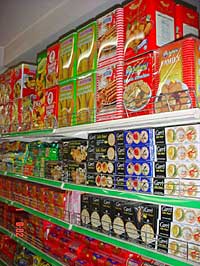 If one examines the array of items in grocery stores, as is this Beed's wont, there are many things that bring smiles to the face. For instance, at first glance it appears that two leading Indian brands of vegetable oil-Dhara and Sweekar-are also made in Nepal. But appearances are misleading, and this is simply an instance of a Nepali manufacturer "borrowing" a successful brandname.
If one examines the array of items in grocery stores, as is this Beed's wont, there are many things that bring smiles to the face. For instance, at first glance it appears that two leading Indian brands of vegetable oil-Dhara and Sweekar-are also made in Nepal. But appearances are misleading, and this is simply an instance of a Nepali manufacturer "borrowing" a successful brandname. It's a lesson any would-be businessperson learns fast in Nepal. It's easy to ride on the successful marketing strategies of good brands. Bluntly put, steal their name, steal their logo, whatever it is that makes them instantly recognisable. So if someone adds a \'Smile' to \'Aqua', don't cry foul. They're simply following a basic rule of trade in this country.
Nepal is a haven for imported goods, if only because there are no rules for disclosure-you don't have to tell anyone where your import was manufactured, and no one even seems to care to know what's in it. Think of all those tins of Belgian ghiu that come here via the Middle East. You can bet that if we had customs officials who could read the Arabic on the packaging materials, we'd be consuming a lot less ghiu past its Best Before date. You know those Malaysian crackers you like so much? Ever wonder what the Bahasa wrapper notes say? We perhaps believe that less comprehensible the names, the better the products.
I realised with a cold thrill this morning that none of us really knows about our rights as consumers, about what protection we have. What happens if one falls ill after consuming a product that has been imported without any declaration? I, personally, and most people I know have no idea what legal recourse we have and with whom-the retailer, the importer or the manufacturer? We don't even know who determines whether imported perishables are safe for human consumption and how. We have no standards to determine the quality of these products
It must be obvious by now that the Beed believes it is important to ensure an open economy. But that does not mean we ignore indis-criminate importing or smuggling. We need to create non-tariff barriers and we need to have mechanisms to monitor our market. For instance, a multinational that has Nepal as its authorised territory spends millions on advertising and marketing. But an importer operating out of the tax havens of Indrachowk reaps more immediate, direct benefits by simply importing the same product from Thailand or Indonesia.
It's time we thought of how we can make the Consumer Protection Act (yes, it does exist) more effective, in words and in deed. It should allow for serious punishment to manufacturers who lift brandnames or importers who don't disclose all the details of their products. In the case of food items, the name of the manufacturer and their address should be clearly visible, along with the expiration details. The retail price should be clearly spelt out. As for imports, the system should only allow for authorised dealers, so if there is a problem, there is an indentifiable point of responsibility from which action is initiated.
Legislation should be followed by action and here it isn't just the government. The business community also needs to get its act together. All our chambers and other business associations should actively ask the government to draft and implement better consumer protection laws. And then there are the consumer forums-they need to get moving.
Plenty of other issues relate to patents, trademarks and disclosure in Nepal. But you can tell we have a long way to go when the Finance Minister appears on national TV sporting a shirt that proclaims loudly Compaq.
Readers can post their views at arthabeed@yahoo.com



